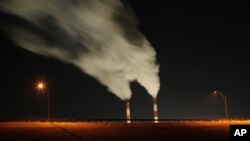Scientists say they have discovered a man-made greenhouse gas 7,100 times as strong as carbon dioxide. More bad news: It has a lifetime of hundreds of years.
Researchers at the University of Toronto in Canada say the chemical – perfluorotributylamine (PFTBA) – is the most radiatively efficient chemical found to date, breaking all other chemical records for its potential to impact climate.
According to Angela Hong, who worked on the project, "radiative efficiency" describes how well a molecule can trap outgoing heat radiation from Earth. This metric indicates the potential for a molecule to impact climate.
“As it turns out, PFTBA has the highest radiative efficiency of all molecules in the atmosphere to date,” she said in an email.
PFTBA has been in use since the mid-20th century for various applications in electrical equipment and is currently used in thermally and chemically stable liquids marketed for use in electronic testing and as heat transfer agents.
Researchers say there are no known processes that would destroy or remove PFTBA in the lower atmosphere, meaning it could have a lifetime of hundreds of years.
Carbon dioxide is used as the baseline for comparison since it is the most important greenhouse gas responsible for human-induced climate change.
“Calculated over a 100-year timeframe, a single molecule of PFTBA has the equivalent climate impact as 7,100 molecules of CO2,” said Hong.
The results of the study appeared in the Geophysical Research Letters on November 27, 2013.
Researchers at the University of Toronto in Canada say the chemical – perfluorotributylamine (PFTBA) – is the most radiatively efficient chemical found to date, breaking all other chemical records for its potential to impact climate.
According to Angela Hong, who worked on the project, "radiative efficiency" describes how well a molecule can trap outgoing heat radiation from Earth. This metric indicates the potential for a molecule to impact climate.
“As it turns out, PFTBA has the highest radiative efficiency of all molecules in the atmosphere to date,” she said in an email.
PFTBA has been in use since the mid-20th century for various applications in electrical equipment and is currently used in thermally and chemically stable liquids marketed for use in electronic testing and as heat transfer agents.
Researchers say there are no known processes that would destroy or remove PFTBA in the lower atmosphere, meaning it could have a lifetime of hundreds of years.
Carbon dioxide is used as the baseline for comparison since it is the most important greenhouse gas responsible for human-induced climate change.
“Calculated over a 100-year timeframe, a single molecule of PFTBA has the equivalent climate impact as 7,100 molecules of CO2,” said Hong.
The results of the study appeared in the Geophysical Research Letters on November 27, 2013.





